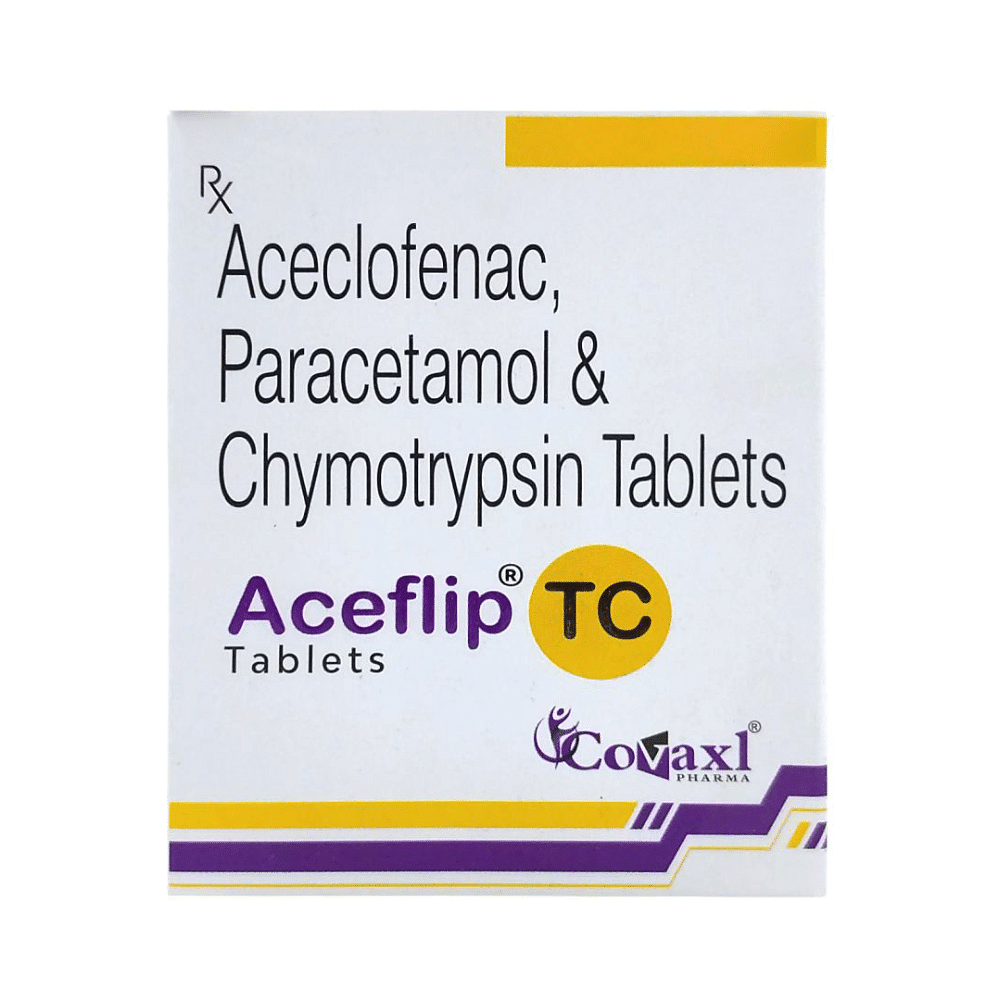
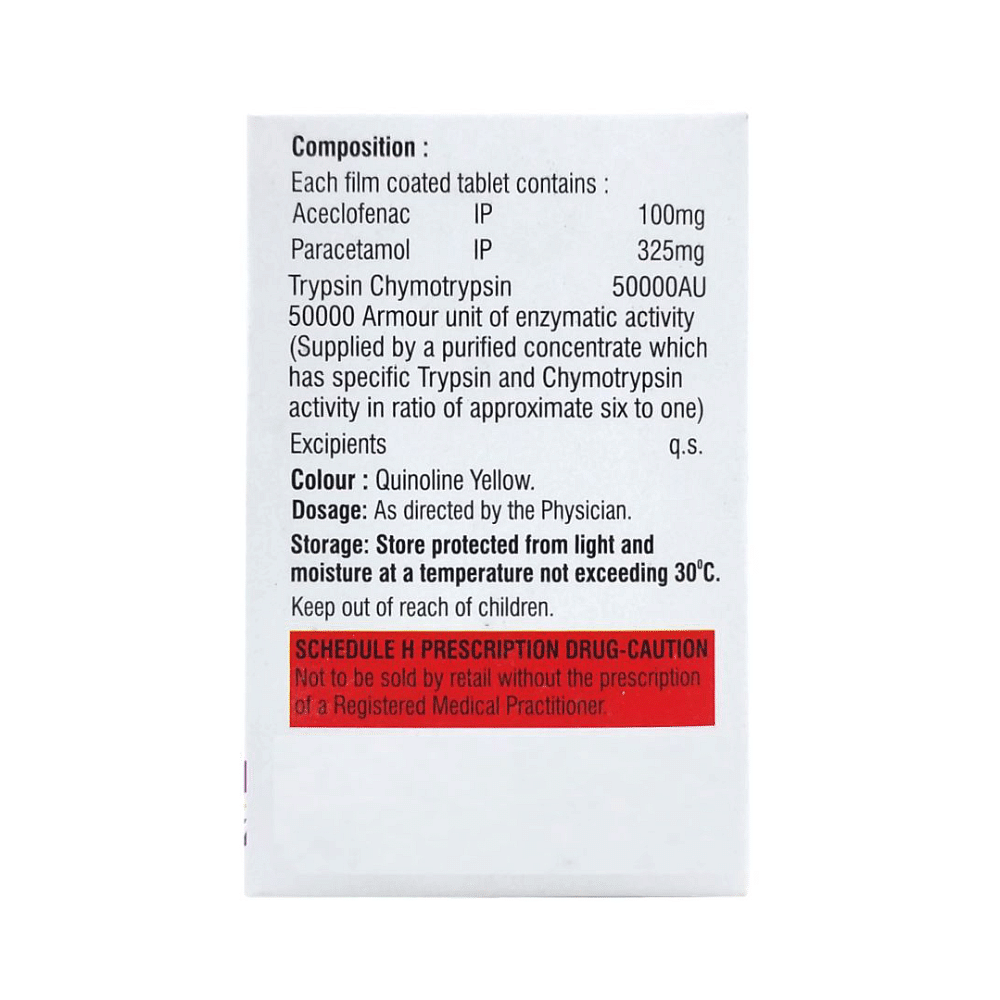
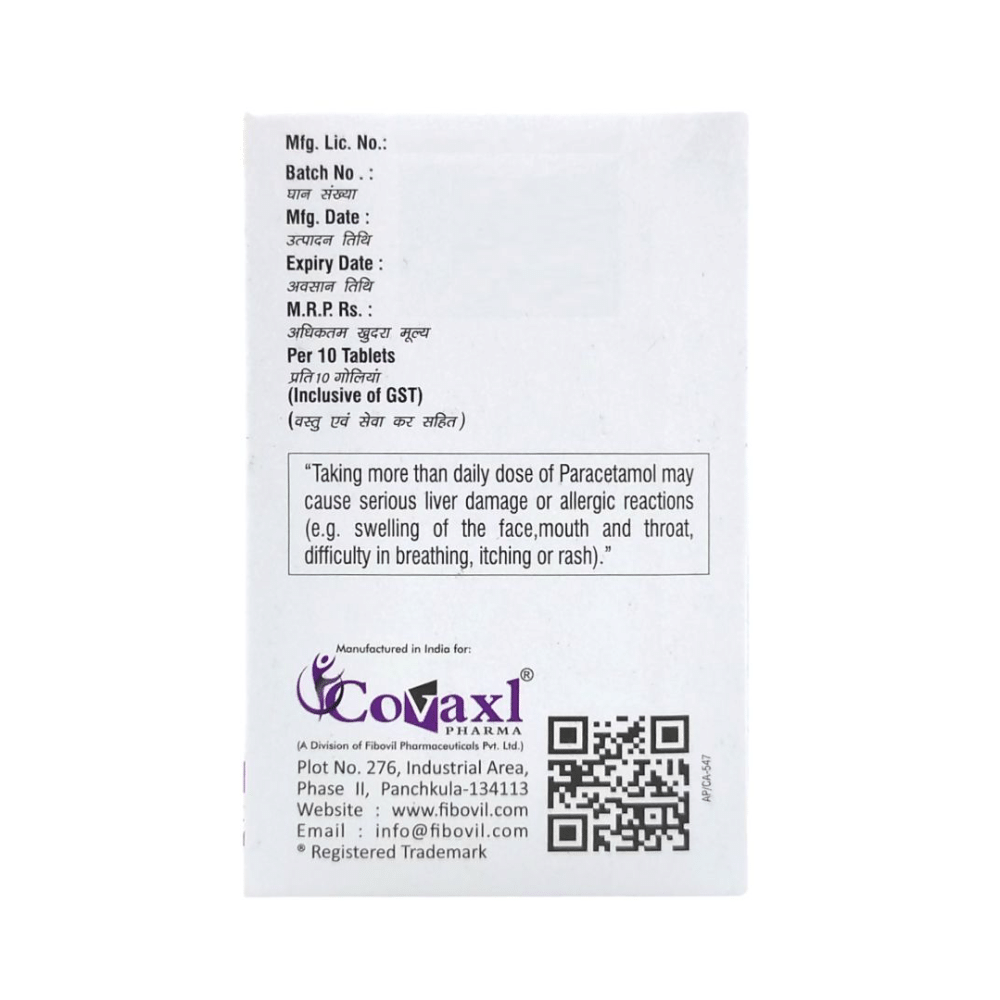
Acefliptc 100mg/325mg Tablet
Manufacturer
Fibovil Pharmaceuticals Pvt Ltd
Salt Composition
Aceclofenac (100mg) + Paracetamol (325mg) + Trypsin Chymotrypsin (50000AU)
Key Information
Short Description
Acefliptc 100mg/325mg Tablet is a pain relieving medicine used to treat pain and inflammation in conditions like rheumatoid arthritis, ankylosing spondylitis, and osteoarthritis.
Dosage Form
Tablet
Introduction
Acefliptc 100mg/325mg Tablet should be taken with food. This will prevent you from getting an upset stomach. The dose and duration will depend on what you are taking it for and how well it helps your symptoms. You should take it as advised by your doctor. Do not take more or use it for longer duration than recommended by the doctor.
Directions for Use
Take this medicine in the dose and duration as advised by your doctor. Swallow it as a whole. Do not chew, crush or break it. Acefliptc 100mg/325mg Tablet is to be taken with food.
Safety Information
Side Effects
Nausea Vomiting Heartburn Stomach pain Indigestion
Alcohol Warning
It is unsafe to consume alcohol with Acefliptc 100mg/325mg Tablet.
Breastfeeding Warning
Information regarding the use of Acefliptc 100mg/325mg Tablet during breastfeeding is not available. Please consult your doctor.
Pregnancy Warning
Acefliptc 100mg/325mg Tablet may be unsafe to use during pregnancy. Although there are limited studies in humans, animal studies have shown harmful effects on the developing baby. Your doctor will weigh the benefits and any potential risks before prescribing it to you. Please consult your doctor.
Interacting Medicines
Medicines containing acetaminophen (drugs for pain/fever or cough-and-cold)
How it works
Acefliptc 100mg/325mg Tablet is a combination of three medicines: Aceclofenac, Paracetamol and Trypsin Chymotrypsin. They work by blocking the release of certain chemical messengers in the brain that cause pain and fever. Trypsin Chymotrypsin is a combination of enzymes which break down proteins into smaller fragments, thereby making them available for absorption into the blood.
Quick Tips
Take it with food to avoid getting an upset stomach It may cause dizziness and sleepiness. Don't drive or do anything that requires mental focus until you know how it affects you Avoid consuming alcohol when taking Acefliptc 100mg/325mg Tablet as it may cause excessive drowsiness and increase the risk of liver damage Do not take it with any other medicine containing acetaminophen (drugs for pain/fever or cough-and-cold) without asking your doctor first
Related Medicines
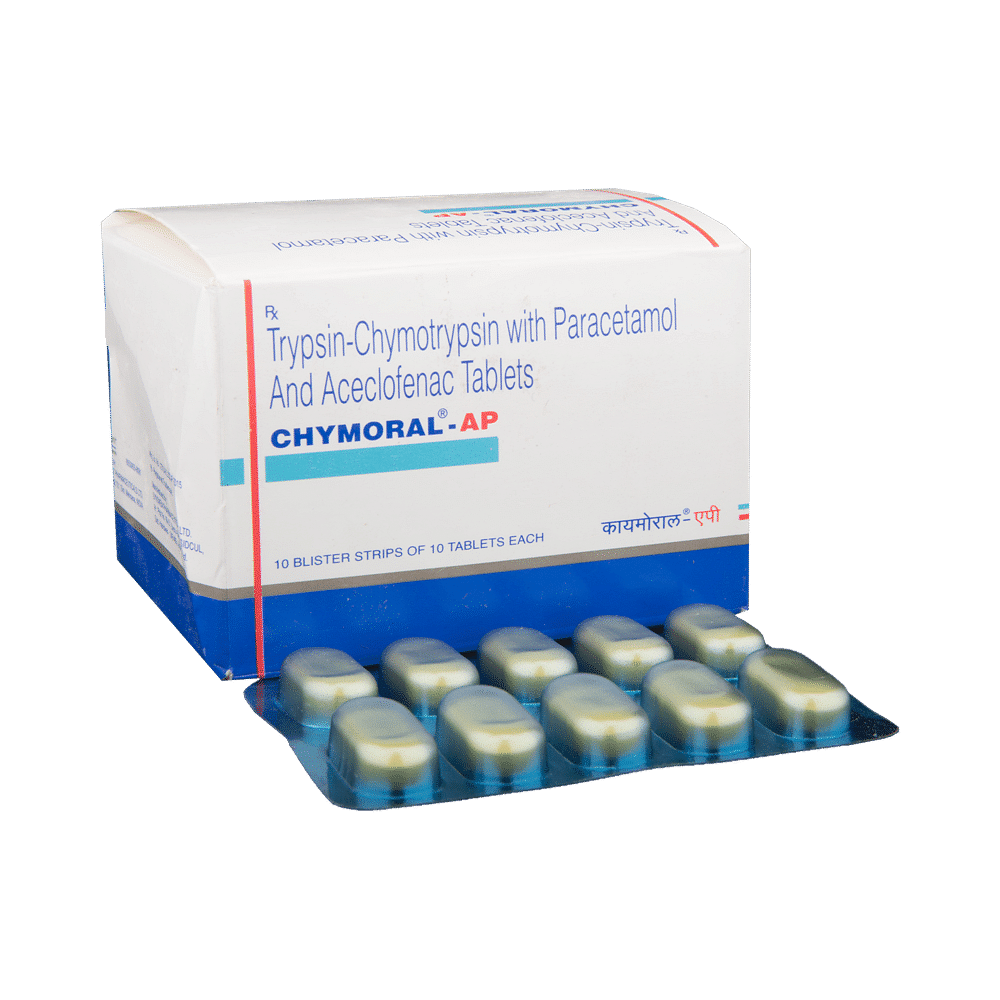
Chymoral-AP Tablet
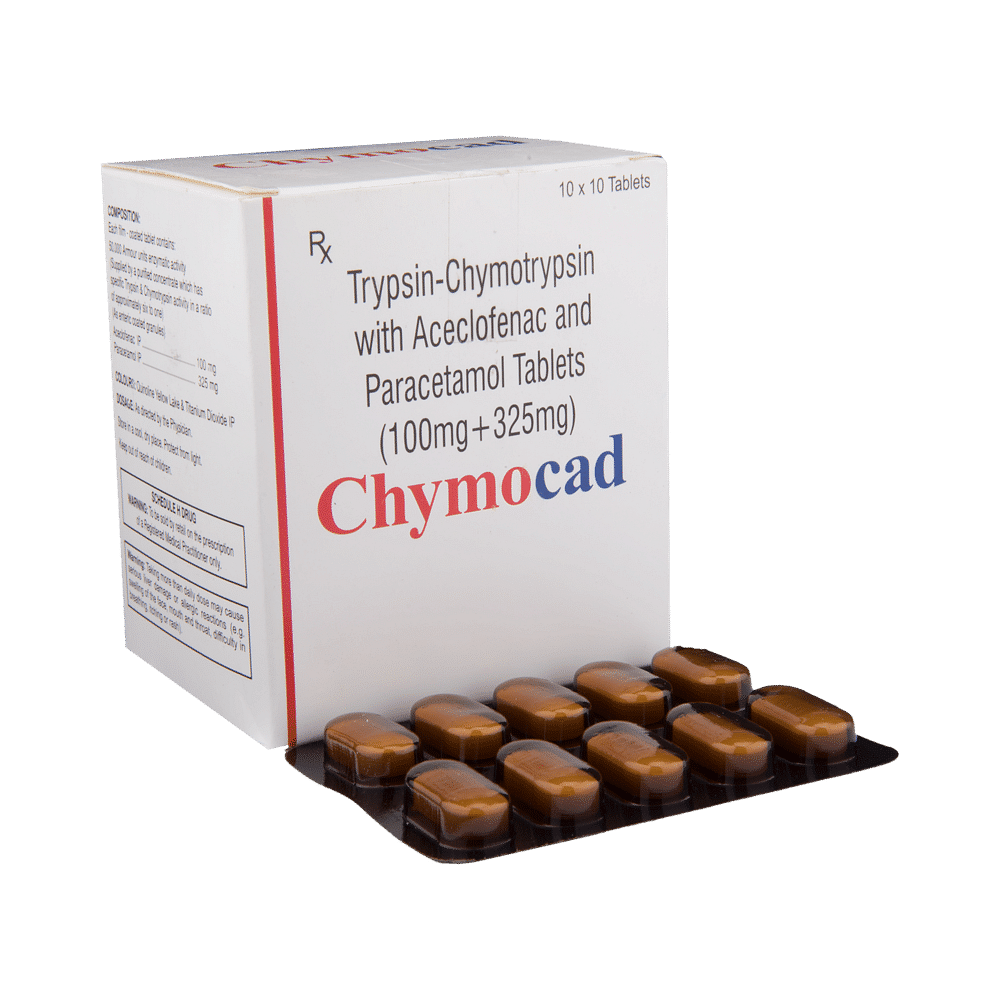
Chymocad Tablet
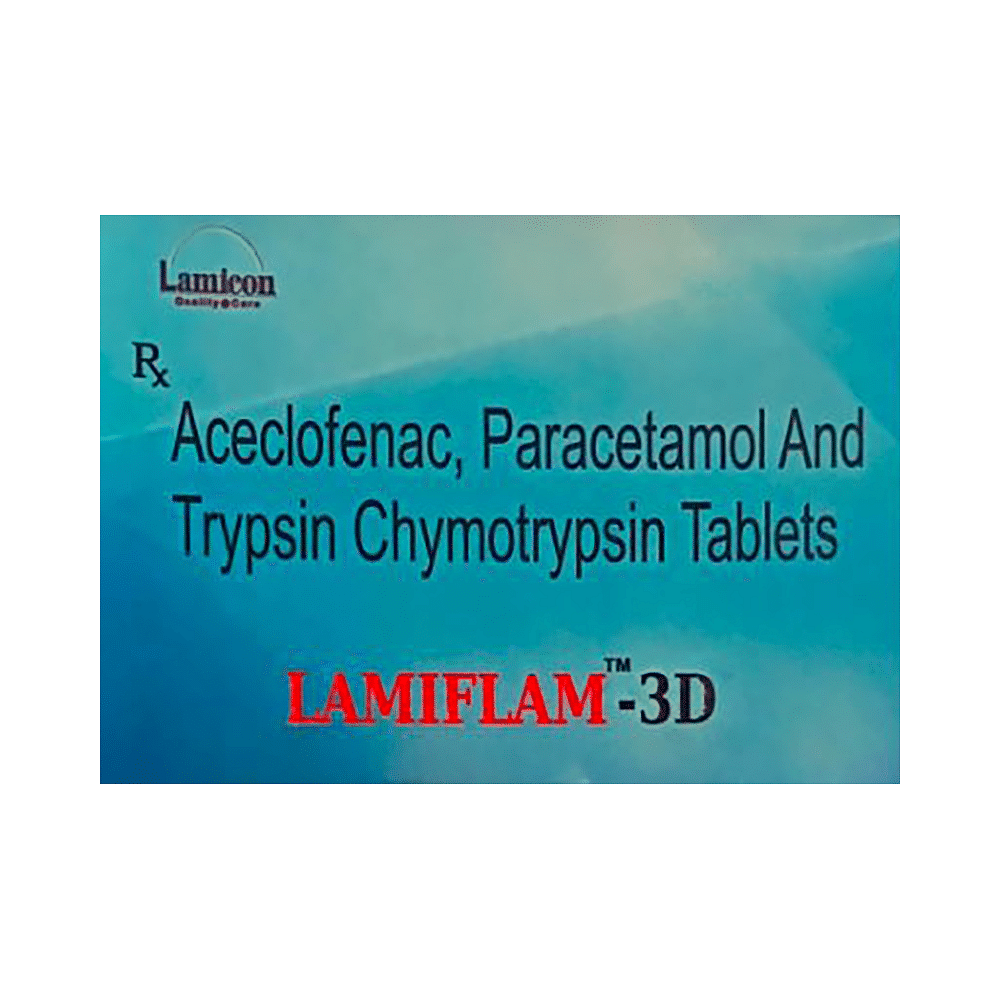
Lamiflam 3D Tablet

Chymoheal Tablet
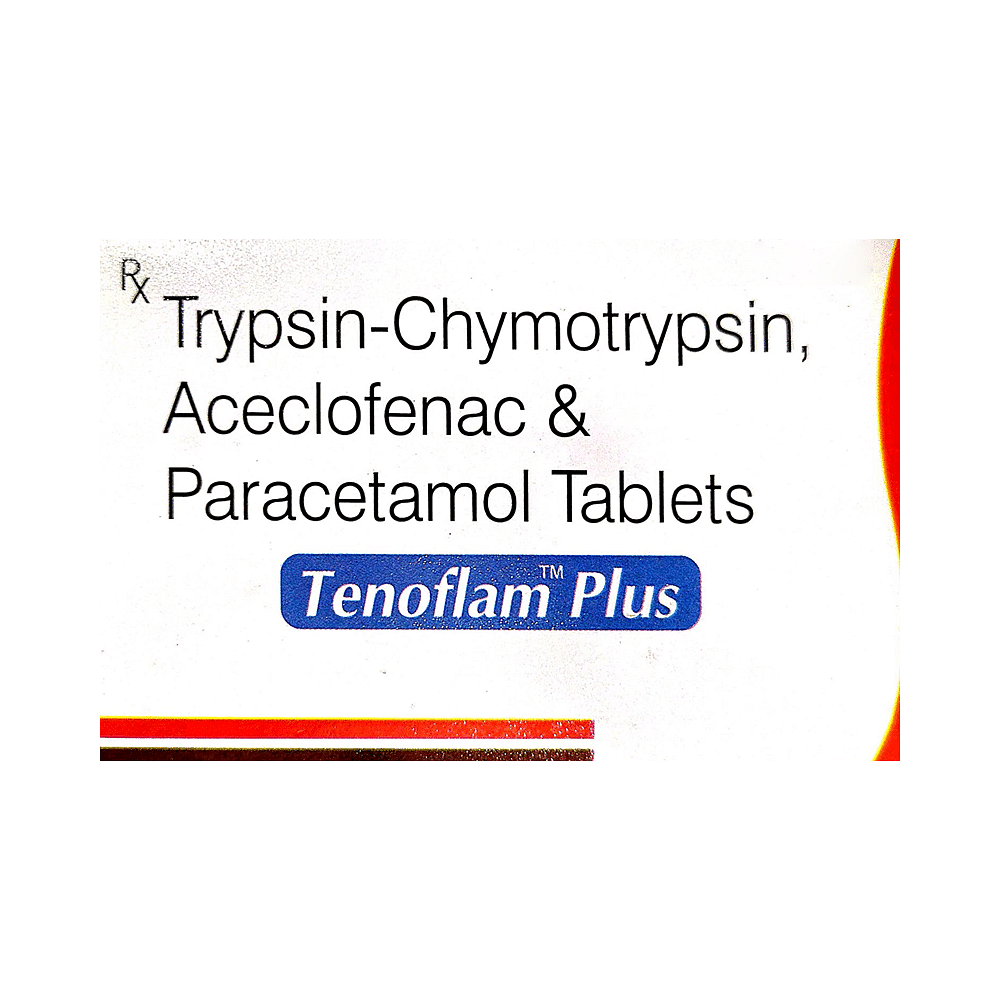
Tenoflam Plus Tablet

Toptrip-Plus Tablet

Just Move XL 100mg/325mg Tablet

Acedoc CT 100mg/325mg Tablet

Aceworld-TC Tablet

Iramol TC 100mg/325mg Tablet
Frequently asked questions
What is Acefliptc 100mg/325mg Tablet?
Acefliptc 100mg/325mg Tablet is a combination of four medicines: Aceclofenac, Paracetamol, Trypsin and Chymotrypsin. This medicine helps in decreasing pain and swelling. It lowers the levels of chemical substances in the body that causes pain and swelling.
Can I get addicted to Acefliptc 100mg/325mg Tablet?
No, there is no report of any patient getting addicted to Acefliptc 100mg/325mg Tablet.
Can I stop taking Acefliptc 100mg/325mg Tablet when my pain is relieved?
Acefliptc 100mg/325mg Tablet is usually used for short term and can be discontinued when your pain is relieved. However, Acefliptc 100mg/325mg Tablet should be continued if your doctor has advised you to do so.
Can the use of Acefliptc 100mg/325mg Tablet cause dizziness?
Yes, the use of Acefliptc 100mg/325mg Tablet can cause dizziness (feeling faint, weak, unsteady or lightheaded) in some patients. If you feel dizzy or lightheaded, it is better to rest for some time and resume once you feel better.
Can the use of Acefliptc 100mg/325mg Tablet cause damage to kidneys?
Yes, long-term use of Acefliptc 100mg/325mg Tablet can cause damage to the kidneys. Normal kidneys produce a chemical called prostaglandins that protects them from damage. Use of painkillers lowers the levels of prostaglandins in the body leading to kidney damage due to long-term use. Use of painkillers is not recommended to patients with underlying kidney disease.
Can the use of Acefliptc 100mg/325mg Tablet cause damage to liver?
Acefliptc 100mg/325mg Tablet contains Paracetamol. This medicine is known to cause harm to the liver especially in the doses above the recommended level. Also, avoid drinking alcohol while taking this medicine, as it may further increase your risk of liver damage. Use of this medicine should preferably be avoided in patients with underlying liver disease. Contact your doctor immediately if you notice any early signs and symptoms of liver damage. These symptoms may include fever, rash, loss of appetite, nausea, vomiting, fatigue, stomach pain, dark urine, yellow skin or eyes and abnormal liver enzymes.
How long will Acefliptc 100mg/325mg Tablet take to act?
It may take about an hour to see the initial benefit of pain relief after taking Acefliptc 100mg/325mg Tablet.
What if I forget to take Acefliptc 100mg/325mg Tablet?
If you forget to take the scheduled dose of Acefliptc 100mg/325mg Tablet and it is almost time for your next dose, skip the dose you missed and take your next dose at the scheduled time. Otherwise, take it as soon as you remember, and then go back to taking it regularly.
Are there any specific contraindications associated with the use of Acefliptc 100mg/325mg Tablet?
The use of Acefliptc 100mg/325mg Tablet is considered to be harmful for patients with known allergy to any of the component or excipients of this medicine. The use of this medicine should preferably be avoided in patients with a history of stomach ulcers or in patients with active, recurrent stomach ulcer / bleeding. It should also be avoided in patients with history of heart failure, high blood pressure, and liver or kidney disease.
What are the side effects of Acefliptc 100mg/325mg Tablet?
Like all medications, Acefliptc 100mg/325mg Tablet can have side effects. Common side effects may include nausea, vomiting, diarrhea, and stomach pain.


